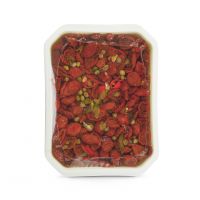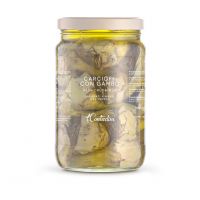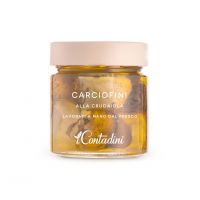
The product
Olive Celline
Black olives from Salento, small and tasty
Code:
93950
Country of origin:
Italy - Apulia
Weight:
1600 g
Minimum order:
1 box of 6 pieces
| Description | Typical olives from Salento of Cellina variety, cultivated and processed in Apulia |
|---|---|
| Appearance | Black olives, small in size |
| Our selection | The most interesting aspect of I Contadini is the deep link with the land and the traditions. The vegetables are produced by the firm, with integrated techniques, in the province of Lecce in Apulia region |
| Suggestions | Tipically used to dress wild salads and meats, try even with a slice of bread |
| Ingredients | 'Cellina' olives (67%), water, unrefeined salt, lemon juice |
|---|---|
| Weight | 1600 g |
| Packaging | Glass jar |
| Storage Conditions (packaged products) | Store in a cool dry place, away from light and heat sources |
| Instructions for use | After opening store in a refrigerator at lower temperature of +4 °C and use within 7 days |
| Nutrition Declaration | Energy: 645 kJ / 157 kcal Fat: 16 g of which saturates: 2 g Carbohydrate: 1 g of which sugars: 1 g Protein: 0,8 g Salt: 4 g Typical value per 100 g |
The producer
I Contadini - Ugento (LE) - Apulia

Why we chose them
"I Contadini " farm, run today by the third generation, has been founded in one of the most suitable areas for the cultivation of vegetables, in
Apulia,
more exactly in Salento, the so-called "land of sun, sea and wind". The fantastic climate of this land, warmed by sun all over the year, together
with
fertile ground structure and positive sea influence, is perfect to obtain excellent tomatoes and all kind of vegetables.
An "integrated production" technique is applied to cultivate more than 20 hectares of open fields vegetables: long tomatoes, cherry tomatoes,
eggplants, courgettes, sweet and hot peppers, artichokes. Vegetables are naturally dried up by the sun of Salento, so that all the water in excess is
taken away and the product is preserved in its organoleptic and nutritive qualities.
Drying vegetables in the sun is a very ancient art, today almost totally abandoned; even though difficult and delicate, it allows to obtain an absolute
unique organoleptic result: softness of pulp, preservation of vitamins, proteins and mineral salts, and a special harmonic flavour which is by far
more
recognizable.
Short production chain and short label: Edoardo Trentin, with his brothers, takes care of the all process, from cultivation to packaging in olive oil,
without preservatives
From the same producer



